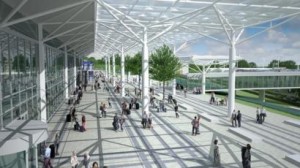Business organisations have slammed the decision by North Somerset councillors to reject Bristol Airport’s expansion plans.
The CBI in the region described the move “a real blow to Bristol and the wider South West” while the Federation of Small Businesses echoed the airport’s own claims that it would force people to drive out of the region to catch flights – so damaging the environment. 
The council’s planning committee went against their own officers’ recommendation on Monday evening to throw out the expansion plan by 18 to 7.
The airport’s owner Ontario Teachers’ Pension Plan had wanted permission to increase the airport’s capacity to handle 12m passengers a year – up from the 10m restriction in its current planning permission, which the airport is expected to reach next year.
It claimed the plans would have generated an extra £1.4bn for the regional economy over 10 years and create 800 jobs on-site and a further 5,000 around the region.
Giving the expansion the thumbs down could deter some airlines from using Bristol – the UK’s fifth busiest outside London – in the future, the airport also claimed.
CBI deputy regional director Ben Rhodes, pictured left, said:“This project would help further extend the reach of our region and help put us in the shop window of the world. 
“Simply put, this project would help create jobs, growth and investment in the South West and we should not put it at risk.”
He said the decision left the “perverse situation” of having people drive out of our region to fly.
“That is bad for our economy and bad for our environment,” he added. “In a post-Brexit world we need schemes like this and this awful news will hurt many businesses in the South West.
“On a day that HS2 is announced for the North we have rejected a major infrastructure scheme in the South West. The CBI believes we must not be left behind.”
FSB development manager for Gloucestershire and Bristol, Sam Holliday, pictured below, said the organisation felt the airport had put forward a strong argument that expansion would be good for the economy and good for both local jobs and the local business supply chain. 
“We are passionately committed to ensuring a green and sustainable future and understand the real concerns many people have about such expansions,” he added. “But we felt the airport was working hard to reduce and offset the environmental impact that would have been created by its plans.
“The figures consistently show that people still do want to fly for both personal and business reasons and by stopping Bristol expanding the worry is that we will just be sending ever more people onto our already crowded road network to access other airports in in the South East instead.”.
The council’s decision was also criticised by The Bristol Hoteliers Association, which represents 40 major hotels in the city with around 4,000 rooms between them.
It warned that the move could have a negative impact on the South West economy and on the city’s hospitality industry in the long-term.
Association chair Raphael Herzog, pictured below right, said: “It has been suggested that some airlines might leave Bristol Airport if it is not allowed to expand, which means services could decrease rather than increase.
“All the while, other locations, such as Birmingham and Manchester airports, are getting bigger, which means Bristol could be left behind and miss out.
 “A thriving, and competitive, airport is vital to the economic prosperity of the region.”
“A thriving, and competitive, airport is vital to the economic prosperity of the region.”
He said the association recognised the long-term aim of protecting the planet and reducing carbon emissions and appreciated that plans were always going to provoke a strong political debate.
“While it is important to take steps towards being more environment friendly, it needs to be done in the right way and not stopping economy growth in the city,” he added.
“There is already a lot of unknown with Brexit and the region should be open to planning that will generate more travellers and therefore cash in the economy.
“In the grand scheme of things, denying Bristol Airport’s expansion plans simply means passengers will travel further to other airports which will be able to meet their needs, which will increase their carbon footprint.”
The decision also comes as the area’s tourist industry enjoys a boost from a number of new attractions either recently opened or in the pipeline, such as The Wave, the pioneering inland surfing facility, the ‘eye-in-the-sky’ Arc Bristol project and the long-delayed multi-use arena at Filton.
“These proposals present Bristol with the chance to be a pioneering leader, offering attractions that people cannot find anywhere else,” added Mr Herzog.
“There have also been many big-name concerts in the city in recent years, which are really helping to put Bristol firmly on the international map as a tourist destination, which is great for the city’s economy.
“It would be a step backwards if more people are not able to come and enjoy these attractions because the airport’s growth is blocked, while other regions continue to thrive.”






























